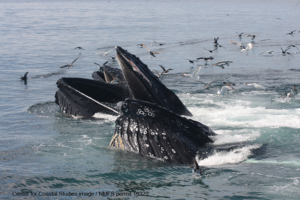
Feeding humpback whales taken by the Center for Coastal Studies (Provincetown, Massachusetts, USA) under U.S. National Marine Fisheries Service research permit 16325
PROVINCETOWN – A recent study coauthored by scientists associated with the Center for Coastal Studies theorized that current global warming trends may have long lasting implications for the earth’s oceans and the animals living in it, such as baleen whales.
Senior Author Dr. Per Palsbøll, adjunct scientist with the CCS and professor with the Marine Evolution and Conservation Group at the University of Groningen in the Netherlands, led the study with an international team of researchers from 28 institutions in 15 nations. The study was co-authored Dr. Martine Berube, fellow adjunct scientist with the CCS.
Through their combined efforts they collected over 7,000 genetic DNA samples from baleen whales and their prey to assess changes in the oceans during the end of the last ice age, 18,000 years ago.
By collecting the genetic samples, the scientists sought to gain a better understanding of what happened to marine populations during previous global warming events and more accurately anticipate global warming’s future impact.
“The best analogy is perhaps growth rings in trees, the thickness of which tells us which years in the past were good and bad years from a cross section of the trunk. The past can be unraveled from the genomes in present day individuals and populations in sort of the same way but much further back into the past, thousand to millions of years,” said Palsbøll.
The study indicated that warming temperatures caused a sea level rise of about 120 meters, causing a vast increase in marine habitats and productivity.
Southern oceans saw exponential increases in baleen whales and krill, while glacial melting events in the northern ocean had a lasting negative effect on marine production.
“Our study suggests that the large-scale oceanic changes set in motion by global warming persisted for many thousands of years after temperatures stabilized,” said Dr. Andrea Cabrera, the original author of the study.
“It is a warning from the past as to what the current global warming may have already started.”
Dr. Palsbøll is an adjunct scientist at the Center for Coastal Studies (CCS) along with another author, Dr. Martine Bérubé. Additional co-authors included CCS staff members Dr. Jooke Robbins, Scott Landry and David Mattila The study was published in Global Change Biology on February 2, 2022.
By, Matthew Tomlinson, CapeCod.com NewsCenter
Edit February 7, 2022: Authors and Co-authors of the study, their participation, and relationships with the Center for Coastal Studies were further clarified. A previous version of this story also mistakenly listed Dr. Jooke Robbins as Dr. Julia Robbins.
























